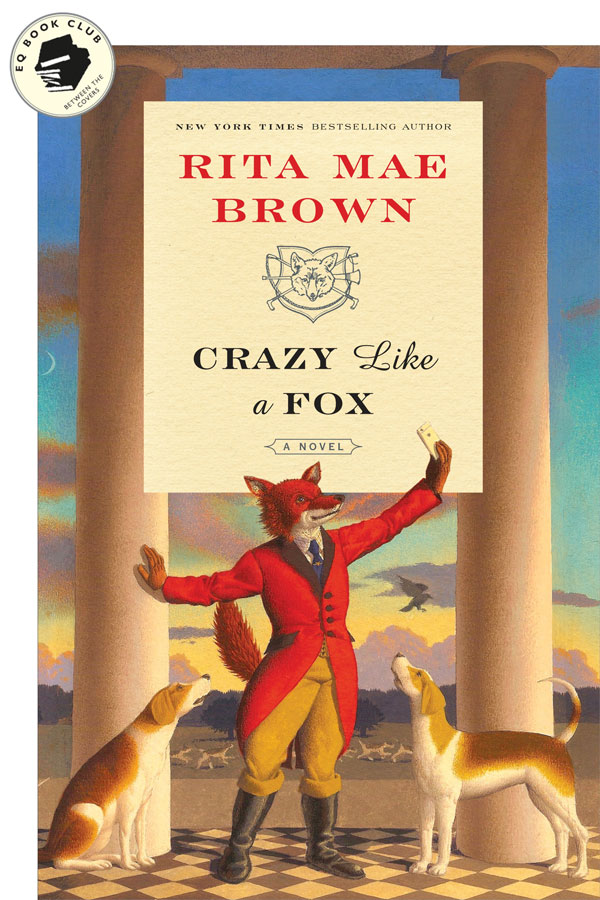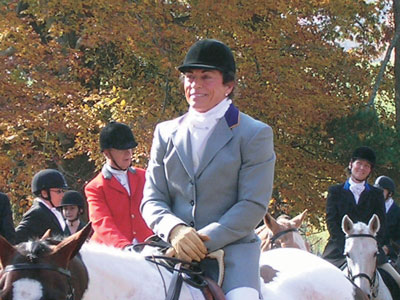
Leaning over the long glass display case, Marion Maggiolo squinted. “This glare drives me crazy.”
Her older friend, Jane Arnold, “Sister,” Master of The Jefferson Hunt Club, responded, “One only notices it at certain angles.”
Once that was out of her mouth she realized she was talking to a perfectionist, one whom she loved, but a perfectionist nonetheless.
Marion pulled her cellphone out of her jacket pocket, placing it just to the left of the offending glare. “Look at that.”
Sister dutifully bent down to look at the cellphone surface. “I guess the phone blocks the light.”
Both women looked upward at the lighting.
“I wonder if we could change the light so it doesn’t glare off the case.” Marion placed her forefinger on her lips. “Well, we can, but we can’t sacrifice brightness or clarity. People do read these displays. They especially like the photographs.”
The two stood in the Museum of Hounds and Hunting located at Morven Park. This room housed the Huntsman Hall of Fame. Each inductee’s life was written in easy-to-read type; his horn was usually on display along with a coat, a cap, and other items germane to foxhunting and the inductee’s personality. The photograph of each Hall of Famer had been chosen with care by the families as well as the Board of Directors. Only one woman had been inducted. An individual could only be considered for inclusion if he had carried the horn for twenty years. Most had hunted far longer than that, but often the photographs chosen were of the gentlemen and lady in their prime.
Sister and Marion stared at such a man, prime and in his prime, Wesley Carruthers. The photograph showed an impossibly gorgeous man, perhaps early thirties, raising a silver punchbowl, a hand on each handle. He had just won best-in-show at the Virginia Hound Show in 1951.
“Didn’t they call him Weevil?” Marion asked Sister, who was about fifteen years older than herself.
“They did. I was just a kid when he won—I was at the show with Mother. I actually did hunt behind him once or twice. I was still in grade school. Mother wanted me to see as many packs and their huntsmen as possible. I’m forever grateful to her because I learned so much. Just soaked it up.”
“You’ve bred a good pack. You must have absorbed something.”
Sister laughed. “True. A pack is one thing you can’t really buy. Oh, people have, but they inevitably ruin the hounds because they don’t know what they’re doing and, worse, they don’t know their bloodlines.” She held up her hand. “Don’t get me started. You know hounds are my favorite subject.”
“I think there are others,” Marion wryly commented, returning her gaze to Weevil.
Sister stared at the beautiful man as well. “A cross between Gary Cooper and John Wayne, when young.”
Marion studied the strong masculine face, the wide shoulders, tiny hips. “The young John Wayne was wonderful-looking.”
“As was Gary Cooper, a Montana boy.”
“Was he?”
“Was, and Wayne was from Iowa. Now Weevil, he hailed from The Plains, Virginia. Grew up with everyone in Northern Virginia, worked his way up to being huntsman by whipping-in with other packs. Started at the bottom, third whipper-in, kennel assistant. In those days, clubs could afford a lot of help. I think he was First Whipper-in at Green Spring Valley in Maryland, before coming back here to carry the horn for Jefferson Hunt.”
Hunt service, like any profession, contains stepping-stones. Certainly talent is a factor but so are drive, social skills, and physical toughness, especially physical toughness. Many whippers-in today express no desire to become huntsmen. They are happy whipping-in, which means riding hard, knowing the hounds, and working on the edges of the pack. If there’s a problem usually a whipper-in sees it first and tries to correct it, like keeping a pack from running onto a highway in pursuit of the fox that knows exactly what he or she is doing. A few rich hunts still have large paid staffs. Most hunts feel fortunate to have one paid whipper-in, the rest being honorary, which is to say, amateurs. And often those honorary people are fantastic but hold well-paying jobs or provide taxi service for the kids before and after school. This is the main reason so many current whippers-in don’t aspire to being huntsmen. They can’t afford it. Their jobs are too good. Few hunts could survive without honorary whippers-in, and this included The Jefferson Hunt where Weevil had been huntsman. Jane Arnold, “Sister,” was the Master of Jefferson Hunt, had been for over forty years, but Weevil was long gone by the time she’d moved to central Virginia.
Marion sighed. “He was gorgeous. They never found him, did they?”
“No.” Sister slightly shook her head.
“Murder. No one thought he died a natural death.”
Sister heard footsteps. “Weevil managed to cuckold most male members of the Virginia and Maryland hunts.”
“Let’s go,” Jake Carle, Director of the Hall of Fame, called to them. “If we don’t go now we won’t get a table.” He then walked to the top of the stairwell, crossed to another room, climbed a few steps to the ballroom, and called to Monica Greenberg. “Leesburg.”
“In a minute,” she replied.
“You know where to find us.” He turned, retraced his steps, meeting Sister and Marion.
The three left. Jake had finished his meeting with other board members. Everyone hopped in their cars to drive into Leesburg.
No sooner had they been seated than Monica was directed to their table. As she walked across the restaurant, all eyes followed her. Some recognized her as the sidesaddle rider on the fabulous Winter Party, a sensational team. She carried herself with perfect posture, head held high, attractive enough on the ground but on a horse the effect was pure beauty.
Paying no mind to people’s reactions, she took the offered seat. “Were you talking about me?” she teased.
“We wondered how your history of sidesaddle is coming along.” Jake liked anything historical, as did Sister and Marion.
“When I asked for photographs I had no idea how much material is out there. Most of it in black and white. I thought I’d receive about fifteen photographs. I have sixty-two.”
“Bet the early ones are smashing.” Marion couldn’t wait to see the finished exhibit, pictures framed, biographies next to them.
“I have one from 1860 but quite a few starting in the 1870s and moving onward. Obviously men liked to take photographs of women riding sidesaddle. A well-turned-out lady turns heads.” Monica smiled.
“You certainly did. Still do,” Jake complimented her.
He thought of the three as “the girls” but would never say that. Given that Sister, Marion, and Monica knew exactly who they were, if he had done so they wouldn’t have been offended.
Changing the subject, Monica asked, “Did you all take two cars?”
“We did,” Marion answered.
“Thought so, as I heard three sets of footsteps on the stairs, first one then a few minutes later more.”
No one thought anything of the observation at the time.
As with any group of people who know one another well, and work together, they talked about the museum, about Monica’s efforts for the Washington opera, about Marion’s planned fashion show of hunting attire to raise money for the museum come November.
“Seems far away but it’s only ten weeks.” Marion placed her small notebook by her plate. “First question. Do we have the models wear garters?”
“Chorus girls wear garters,” Monica mischievously said.
This provoked a discussion about achingly proper attire as opposed to comfortable turnout. Boots no longer actually folded over, which was what created the need for a garter in the first place back in the seventeenth century. Far be it from foxhunters to bypass a tradition whether useful or not.
Sister jumped right in. “I wear them on the High Holy Days.”
Jake grimaced. “You would. If ever I have a question about proper turnout, I refer to you, madam.”
She smiled at the good-looking former Keswick Master. “Is that a gentleman’s way of saying I’m older than dirt and remember everything?”
“Sister, you will always command a room.” He grinned at her, proving once again why women adored him.

Excerpted from CRAZY LIKE A FOX by Rita Mae Brown Copyright © 2017 by Rita Mae Brown. Excerpted by permission of Ballantine Books, an imprint of Random House, a division of Penguin Random House LLC. All rights reserved. No part of this excerpt may be reproduced or reprinted without permission in writing from the publisher.
